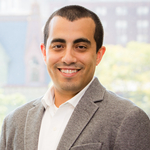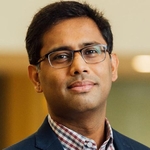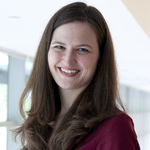About
In image-based profiling, scientists extract high-dimensional representations from biological images. These representations provide a unique perspective into the underpinnings of biological systems, but there also unique challenges. In this workshop, we will introduce image-based profiling as a concept, and discuss several exciting new application areas in industry and academia.
Invited Speakers
Dr. Niranj Chandrasekaran, Broad Institute of MIT and Harvard
Dr. Chandrasekaran is our first speaker, and he will introduce the field of image-based profiling. He is currently a postdoctoral scientist in the Carpenter-Singh laboratory at The Broad Institute of MIT and Harvard, and has been working in the image-based profiling field for two years. His background is in biophysics and genomics, and he has provided significant leadership for the Joint Undertaking in Morphological Profiling (JUMP) Cell Painting Consortium, bringing together a dozen pharmaceutical and non-profit entities to create a large, publicly available Cell Painting dataset of chemical and genetic perturbations. He is one of the first software architects of the image-based profiling pipeline, which include the necessary steps to process and normalize readouts derived from cell images.
Dr. Juan Caicedo, Broad Institute of MIT and Harvard
Dr. Caicedo is our second speaker, and he will discuss emerging strategies for how to extract morphology representations from cell images. As a Schmidt Fellow at The Broad Institute of MIT and Harvard, his laboratory works on computer vision applications using images from a variety of sources. His research is primarily focused on using machine learning to model and extract information from biological images. He is developing representation learning algorithms for extracting image-based, single-cell embeddings to characterize cellular phenotypes at large scale, to support applications in high-throughput screening, drug discovery and functional genomics projects.
Dr. Paula Marin Zapata, Bayer
Dr. Marin Zapata is our third speaker of the workshop. She will discuss the nitty-gritty technical challenges for working with image-based data. She will discuss these challenges in the context of a particular large-scale project, the Joint Undertaking for Morphological Profiling (JUMP) Cell Painting Consortium, which is a collaborative effort involving over a dozen industry and academic partners. Dr. Marin Zapata is a research scientist, currently working at the Machine Learning Research group of Bayer Pharmaceuticals in Berlin, with a background in imaging data, deep learning, and cell biology.
Dr. Imran Haque, Recursion
Dr. Haque is our fourth speaker, and he will begin the application-oriented portion of our workshop. He is currently the Vice President of Data Science at Recursion Pharmaceuticals, and he will discuss focused application areas in various stages of development at the company. Recently undergoing its initial public offering and announcing a large expansion, Recursion has continued to push boundaries in the field of image-based profiling and has four clinical trial candidates in the pipeline so far. Dr. Haque has a background in computer science and electrical engineering, and ten years of industry leadership experience.
Dr. Kyogo Kawaguchi, RIKEN Cluster for Pioneering Research
Dr. Kawaguchi is the fifth speaker of our workshop, and will discuss his application of predicting cell fate decisions in tissues using graph neural networks and image-based profiling. Dr. Kawaguchi is currently a team leader in the RIKEN Cluster for Pioneering Research interested in collective cell dynamics and phase transitions. Dr. Kawaguchi has a background in non-equilibrium statistical mechanics and biophysics.
Dr. Susanne Rafelski, Allen Institute for Cell Science
Dr. Rafelski is the sixth and final invited speaker of our workshop. She will discuss ongoing image-based profiling applications at the Allen Institute for Cell Science (AICS) aimed at understanding the interplay between cell organization, dynamics, behavior, and fate. AICS is generating publicly available stem cell lines and producing open access tools and resources for computational image analysis. Dr. Rafelski is currently the Deputy Director overseeing the Scientific Programs at AICS and has a background in quantitative cell biology, live-cell imaging and analysis, molecular genetics, and computational biology.
Organizers
Gregory P. Way, PhD - Dr. Way is an Assistant Professor at The University of Colorado Anschutz Medical Campus. His lab is focused on developing cell biology as the next generation of systems biology readout. Prior to joining CU, Greg was a postdoc in Anne Carpenter’s lab in the Imaging Platform at the Broad Institute of Harvard and MIT, where the major assay and software used in image-based profiling was developed. Having trained in transcriptomics/genomics, Greg is eager to bridge the two worlds. He is also the lead software engineer for the “cytominer ecosystem”, which is a python package for processing and evaluating image-based profiling readouts. He serves on the Board of the CytoData society, whose mission is to advance the field of image-based profiling.

Hannah Spitzer, PhD - Dr. Spitzer is a postdoc in Fabian Theis’ lab at the Institute of Computational Biology at Helmholtz Munich. She is a computational biologist passionate about the human brain and other medical applications. Hannah develops deep learning approaches to extract morphological features important for studying brain biology and disease. She is eager to integrate additional data types in her quest to uncover important brain functions.
Philip Burnham, PhD - Dr. Burnham is a postdoc in Arjun Raj’s lab at The University of Pennsylvania where he develops live cell imaging platforms to study cell state transitions and ultimately predict cell fate. His current work applies these methods to describe regeneration in gastrointestinal organoid systems. His past training includes building genomics and bioinformatics tools to study infectious disease and design new diagnostics. In the future, he hopes to merge his interest in infectious disease with image-based profiling platforms.
Arjun Raj, PhD - Dr. Raj is a Professor of Bioengineering and Genetics at The University of Pennsylvania. His lab is interested in developing a quantitative description of cellular function. His lab’s work blends experimental techniques from imaging and genomics with informatics, computational, and theoretical approaches to develop models for how individual cells work. Areas of interest include cancer biology, stem cell biology, and gene regulation. He thinks seeing is believing in biology.
Fabian Theis, PhD - Dr. Theis is the Director of the Institute of Computational Biology at Helmholtz Munich and Professor of the Technical University of Munich. He is a world leader in computational biology. He pioneers new computational approaches for data integration, new methods for single cell analysis, and develops widely used software like scanpy and anndata. His participation in the workshop provides a link between single cell and image-based data, and he will help fuel excitement in the power of morphology data integration.
Sh

antanu Singh, PhD -Dr. Singh is a Senior Group Leader at the Broad Institute. He is a leader in image-based profiling and has pioneered the development of computational methods and new datasets in the field. He is excited about the rapidly developing fields of high-dimensional biology and is eager to bring them together towards understanding human diseases and finding new cures.
Anne E. Carpenter, PhD - Dr. Carpenter is an Institute Scientist and the Senior Director of the Imaging Platform at the Broad Institute of MIT and Harvard and a luminary in the computational biology field. She is a leader in image-based profiling, having co-invented its major assay, Cell Painting, and its major feature extraction software, CellProfiler. She leads the public-private JUMP-Cell Painting Consortium which aims to produce the largest publicly available database of Cell Painting image data. She is eager to bring the single-cell communities together across mRNA, protein, morphology, and other readouts.

Schedule
This workshop is Monday January 3, 2022 from 1:30-4:30 pm (the PSB conference itself is Jan 3-7, 2022)
- [TIME] 20min: A primer on image-based profiling
- Speaker: Dr. Niranj Chandrasekaran, Broad Institute of MIT and Harvard
- Speaker: Dr. Niranj Chandrasekaran, Broad Institute of MIT and Harvard
- [TIME] 20min: Measuring cell morphology with image processing and machine learning
- Speaker: Dr. Juan Caicedo, Broad Institute of MIT and Harvard
- Speaker: Dr. Juan Caicedo, Broad Institute of MIT and Harvard
- [TIME] 20min: Technical challenges for processing image-based profiling data
- Speaker: Dr. Paula Marin Zapata, Bayer
- Speaker: Dr. Paula Marin Zapata, Bayer
- [TIME] 15min: Break
- [TIME] 20min: Drug discovery with image-based profiling at Recursion
- Speaker: Dr. Imran Haque, Recursion
- Speaker: Dr. Imran Haque, Recursion
- [TIME] 20min: TBD
- Speaker: Dr. Kyogo Kawaguchi, RIKEN Center for Pioneering Research
- Speaker: Dr. Kyogo Kawaguchi, RIKEN Center for Pioneering Research
- [TIME] 20min: TBD
- Speaker: Dr. Susanne Rafelski, Allen Institute for Cell Science
- Speaker: Dr. Susanne Rafelski, Allen Institute for Cell Science
- [TIME] 15min: Break
- [TIME] 30min: Lightning talks
- Five selected talks on new computational approaches, data types, and software for image-based profiling (6 min each)
We will select the top five most timely and complimentary poster submissions for lightning talks. See Call for Participation below.
Call for Participation
We invite you to submit an abstract on relevant image-based profiling research that is in progress or has been recently published. You will present your abstract as a poster in the PSB 2022 poster session. To submit your abstract, follow all instructions provided at https://psb.stanford.edu/abstract.html
We will also select five exceptional and complementary abstracts as lightning talks (6 minutes each).
If you are interested in submitting your poster for a lightning talk, submit through the normal PSB registration system and also directly by email to Gregory Way for consideration by the workshop committee. The committee will review all abstracts submitted as lightning talks and aim to inform the selected participants no later than December 15, 2021.
At least one author of each selected lightning talk must register, attend, and present the work in person. Authors are required to submit a brief abstract by the abstract deadline (December 6, 2021). Note that we are not able to provide travel support to the selected speakers.
